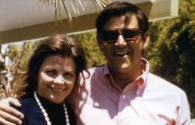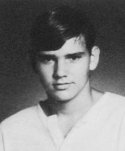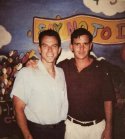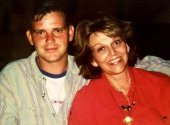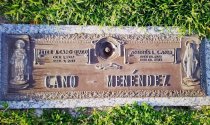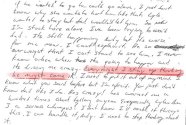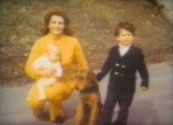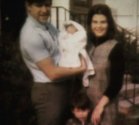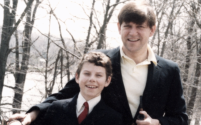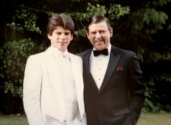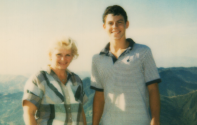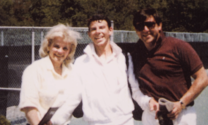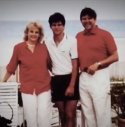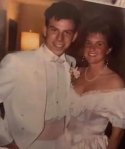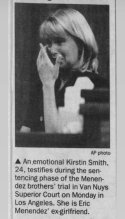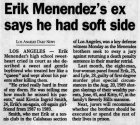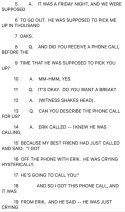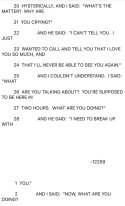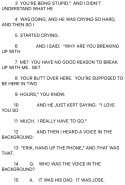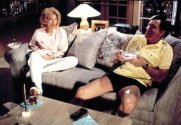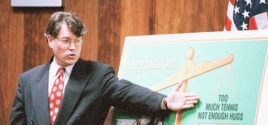Erik and his grandmother, Maria Carlota Lliano Navarro Menendez (December 8, 1917 - March 5, 2009). She was the first woman inducted into the Cuban Hall Of Fame, due to winning five gold medals for swimming in 1935 at the Central American and Caribbean Olympics (Erik inherited her talent in swimming). Lyle and Erik's grandfather, Jose "Pepin" Menendez Pavon, was a pro soccer player.
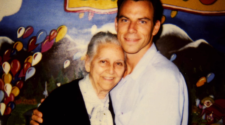

Although Maria stood by her grandsons until the day she died (her husband predeceased her in 1987) she was never happy about the family secrets being revealed. She did not testify in either trial and did not agree to be interviewed by either side (although she occasionally spoke to prosecutor Pamela Bozanich to give her "tips" about the family lifestyle, which is bizarre considering that the prosecution was seeking the death penalty against her grandsons), and told her daughter Marta Cano when she was preparing to testify, "You will kill your brother twice." Erik would tell Dr. William Vicary, the psychiatrist who treated him at the L.A. County Jail, that as much as he loved his grandmother, she had an "evil side". It wasn't until after her mother's passing that Marta felt comfortable enough to share another dark family secret, something she had witnessed several times as a young girl in Cuba. Marta saw her mother fondle Jose when she was changing his diaper on more than one occasion. Beginning when he was three years old, Jose was placed in his mother's bed every morning by his father while he dropped his daughters at school and went to work. This continued until Jose turned six, then he was enrolled at a school that started at 1:30 pm. Maria was, according to Marta, "obsessed" with Jose. She never disciplined him and let him run wild, but also controlled him. This explains his adult behavior in many ways. He was kicked out of several schools, frequently bullied other children, and masked his feelings of insecurity by behaving as if he was superior to others.
Mary Louise "Kitty" Andersen and her brother Brian Andersen (who died October 2, 2017).
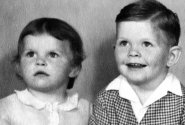
Their father Charles "Andy" Andersen, was violent toward their mother, Mae Maloney Andersen; it wasn't uncommon for him to beat her in front of the children. Brian and his brother Milton were also on the receiving end of their father's abuse (which is strange since they refused to believe that their nephews were abused by their parents). Charles and Mae eventually divorced, which was a big scandal in the 1950s, especially in a small town. Kitty felt ostracized and her mother became an alcoholic and emotionally dependent on her youngest child. This explains Kitty's attitude that "Divorce is the worst thing that could happen to a woman" and even told her sons at one point, "My parents' divorce ruined my childhood." She would later tell her therapist that she had married a man just like her father, "the very man I tried to run away from." She refused to divorce Jose, even though he was unfaithful, abusive to her at times, and abusive toward their children. Kitty took her anger and frustration out on Lyle and Erik. Charles remarried and changed his ways, and while Kitty still had contact with him during her adult life (he passed away before the first trial), she never forgave him for divorcing her mother and leaving the family. The alcoholism is also a cycle that would repeat with Kitty, as well as depression, and there were times when she became emotionally dependent on Erik, just as her mother had been on her. Kitty's sister Joan married at seventeen, perhaps to escape that chaotic home life. The following year, Kitty was abruptly sent away to boarding school, and this led Joan to believe that Kitty was sexually abused, possibly by a family member. Sadly, sending abused children away was common practice at the time, which often compounded the sense of trauma and shame.
In the first trial, the defense had wanted to have family members testify about Jose and Kitty's early lives, to show how the cycle had repeated, but the prosecution objected, claiming it was "too remote" to be relevant, and the judge agreed. It's unfortunate because that kind of background information is crucial to understanding the cycle of abuse.
